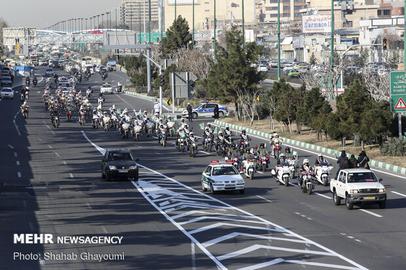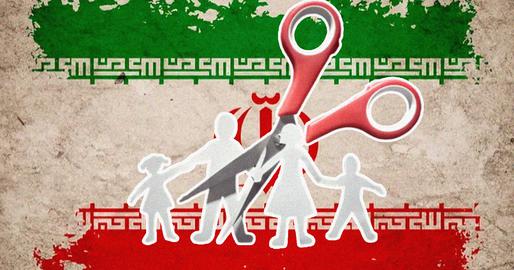Officials in the Islamic Republic say this year’s celebrations of the anniversary of the Islamic Revolution will be no less moving and special, but admit that the emphasis will be more on symbolism and visual flair and less on bringing crowds out on the streets, though the people who do take part in processions will observe social distancing measures.
President Hassan Rouhani and Alireza Raeisi, spokesperson for the National Anti-Coronavirus Headquarters, both said on January 17 that the anniversary will be observed on February 10 as normal, and will include a “motorized” procession, a shift away from the usual parade with thousands of people in attendance.
Restrictions continue to be lifted and eased in cities across the country, prompting fears that cases of coronavirus could rise again, especially since anniversary celebrations in 2020 were thought to have helped spread the virus, and in light of recent warnings from health officials that a fourth outbreak could kill more than 10,000 people in the coming weeks.
A year on, it is common knowledge that Islamic Republic officials were aware of a coronavirus outbreak in several cities from at least mid-February 2020, and certainly they knew of several cases being reported before then. Regardless, they continued to deny this reality and insisted that plans for a march celebrating the anniversary go ahead on February 10 and that parliamentary elections on February 21 go ahead too. The two events were blamed for the first outbreak, and Iran became the second critical center for the disease after China.
Will There be a March This Year?
In recent weeks, Iranian officials have stated that this year’s celebrations will have an emphasis on a “motorized” procession — in other words, the parade will be mainly made up of people in vehicles, a change from previous years, which have seen large crowds of people joining marches. But some Iranians have expressed concerns that coronavirus restrictions have eased in recent days and, despite experts' warnings, many more cities have been classified as “normal” or with low numbers of coronavirus cases.
Alongside announcements from Rouhani and the head of the coronavirus taskforce about the celebrations came the lifting of traffic bans in 413 cities. The secretary for the taskforce’s social committee confirmed there would be no traffic bans or fines for traveling in cities deemed to be in “yellow” or “blue” — in other words, minimal — states of alert.
At the same time, the Islamic Propaganda Council, which runs government ceremonies in Iran, has announced plans for the first days of the 10-day Fajr celebrations, which are held every February to mark Ayatollah Ruhollah Khomeini’s return to Iran and the fall of the monarchy. The council also stated that "details of other plans will be announced later."
Nosratullah Lotfi, the council's deputy, said at the end of January that "24 specialized work groups" had been set up to plan "more than 42,000 Fajr Period programs and events." At the same time, he stressed the "health-oriented" nature of the ceremonies and that there would be "strict observance of health guidelines" at all events.
What if There is a New Wave of Coronavirus?
Almost all health officials and experts in Iran have warned that if the current move toward "normalization" continues, Iran will be hit by a fourth wave of the outbreak in March, claiming more victims.
Minoo Mohraz, a member of the scientific committee of the coronavirus taskforce, warned of an increase in both hospitalizations and cases, describing the situation as "very worrying." She confirmed, "If we continue with this trend, we will probably see a new rise in March and the fourth wave of coronavirus outbreak in Iran."
"With each wave, the number of deaths will increase by between 8,000 and 10,000 people or even more," said Alireza Raisi, the spokesperson for the National Coronavirus Headquarters.
The conflict between the various factions of power in the Islamic Republic has been escalating in recent months, and the matter of February 10 government-led rallies has become the latest weapon. Rouhani's warning about the increase in deaths "over the last two months of the [Iranian] year" and some officials’ insistence that the situation is improving and that some activities should resume to normal levels are good examples of how these political battles have played out in the country’s approach to public health.
"The color of cities has now reached mainly yellow and blue [lower alert levels],” said interior minister Abdolreza Rahmani Fazli in a recent statement. “And as a result we are witnessing an opening of activities in various areas."
History of Lying and Secrecy
The Islamic Republic reported the first cases of coronavirus disease and tis first death on February 19, 2020. However, the evidence available shows that the virus had been spreading for at least a month before this date, and officials had been aware of it.
The Supreme Leader of the Islamic Republic, Ali Khamenei, said on February 23, 2020, two days after the elections: "So much work was done to prevent people from participating in the elections, in cyberspace, in various areas ... and this disease also became a good excuse. On Thursday night, the night before the elections, the news of this virus and this disease was announced in Qom, for example. The enemy started its propaganda at dawn on Thursday saying that people should not go and stand in the queue to vote; saying this and that, there is disease, there is illness, there is a virus... but people came to the polls and the city of Qom was one of the busiest constituencies in the election."
It was later revealed that the Supreme Leader himself was observing coronavirus health guidance and restrictions at that time and that his bodyguards would not allow anyone to approach him, a fact that was revealed by a eulogist who took part in a meeting with the leader on February 15.
Of course, the list of lies and secrets told by Islamic Republic officials is long, prompting a large number of citizens to express doubts on social media platforms about the veracity of Iran’s health policies in recent days, with many of them posting sarcastic or humorous remarks.
For example, one wrote on Twitter: "The closer we get to February 10, the more likely it is that it will be announced on television that a few people have been even been resurrected due to coronavirus."
Many people also predicted that after February 10, Iran’s official coronavirus statistics will report an increase. "The culture of the revolution is so rich that it has even digested the coronavirus," wrote one person. "Now the coronavirus will automatically subside for February 10 and will then return again for Nowruz New Year trips."
Another also predicted what will happen over the next five months on Twitter, also stating that the number of coronavirus cases will rise after February 10. "As long as the government bans travel on Nowruz, this trend will continue until the end of May, and as June approaches and with it the presidential election, the coronavirus will decline again."
In 2020, the first wave of Iran’s coronavirus outbreak occurred just after the government-led Fajr ceremonies and parliamentary elections were held. Health officials say that if the current trend continues, there will be a fourth wave in 2021, not long after government rallies have taken place.






























comments